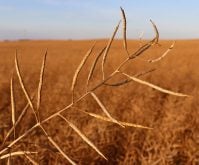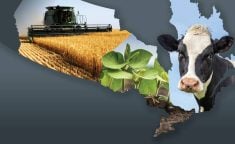Producers say they hope the latest changes to Agricultural Crown Lands regulations in Manitoba put an end to the controversy and confusion of the past four years.
“I think these changes make the system a lot more workable,” said Manitoba Beef Producers general manager Carson Callum. “The changes that happened in 2019 were against the input that we provided to the province. I think it’s a positive step forward for the Crown lands file.”
Why it matters: The Agricultural Crown Lands system has been embroiled in controversy since 2019, when new regulations sparked outrage among forage leaseholders.
Read Also

AAFC organic research program cut
Canada’s organic sector says the loss of a federal organic research program at Swift Current, Sask., will set the industry back.
Manitoba’s agricultural Crown lands are parcels of land vested to Manitoba that the government leases to producers for agricultural use, including grazing, haying or annual cropping. The vast majority of these lands are used by cattle operations.
The province announced the latest changes to Crown land regulations July 31. They mirror recommendations released two months ago and follow a 45-day public comment period that included aboriginal groups, producer groups and leaseholders.
“The Agricultural Crown Lands Program is meant to strengthen the livestock industry, enhance productivity and encourage growth,” said Manitoba Agriculture Minister Derek Johnson. “At the same time, the ACL program needs to work for leaseholders and Indigenous peoples who use these lands for traditional purposes and to exercise treaty rights.”
Years of changes
The amendments appear to address many objections leaseholders have levied against the system.
The province began to overhaul the ACL program in late 2017, when then-agriculture minister Ralph Eichler promised changes to make the process more transparent. The old points system, which weighted lease allocations according to things like herd size, income and proximity, had come under fire by the industry for its lack of transparency.
Since then, the issue has been fraught with challenges. A legislative change set up ACL allocation as an auction-based system. In fall 2019, that was accompanied by sweeping regulatory changes. Among them, rent was set at market-based rates, lease terms were set at 15 years, and the ability to transfer a lease (unit transfer) was eliminated.
There were immediate objections from leaseholders.
The main irritants were the much higher rental rates (several times higher within the span of two years), shortened lease length (a right of renewal was later added to ensure continuity for existing leases), lack of valuation for land improvements, and the elimination of the unit transfer, so that leaseholders could no longer transfer the lease to new owners when they sold their farms.
The latter issue later generated even more complaints, after an initial promise of a one-time transitional transfer, meant as a sort of grandfather clause for farmers on their way out of the industry, fell to the wayside.
Leaseholders said they were considering legal action.
The newest ACL Leases and Permits Regulation enables 15-year leaseholders to transfer the remaining years of their leases to an eligible third party and allows legacy leaseholders to transfer their leased land to a third party by nominating the next leaseholder.
It also extends lease terms to a maximum of 20 years, up from 15, if producers invest in forage productivity improvements.
The amendments also make certain concessions to Indigenous groups. In addition to the bands that are already eligible, non-profit Indigenous organizations will now be eligible to hold forage leases. Leases are barred from being transferred to a third party if the Crown lands are selected under Treaty Land Entitlement and impact Indigenous treaty rights.
In terms of land improvements made under their tenure, outgoing leaseholders will now choose between a value set out in the appraisal report or specify a lesser value.
The province said it will formalize the process for assessing land productivity used to determine rent. The province argues this will “create an incentive to manage the land and invest in its productivity.”
“It’s good to see that they’re starting to go back and make tweaks that are beneficial, understanding that they need to still meet the requirements under the Treaty Land Entitlement and all the Indigenous rights that are really important here in the province,” said Callum.
Election year
The Manitoba NDP party characterized the changes as election opportunism.
“For years, the PCs have made terrible changes to Crown lands, which included eliminating unit transfers,” NDP leader Wab Kinew said in an emailed statement. “Now, during an election year, the PCs are trying to walk back their changes to Crown lands after four years of ignoring producers’ concerns.”
Johnson rejected Kinew’s accusation, saying changes represent the evolution of a particularly tricky file.
“A lot of work has been done by the departments over the past year and a bit, and it’s coming to fruition. They can put their rhetoric forward, but my focus is on listening to producers and making changes that will better agriculture and Manitoba,” Johnson said.
Callum said the new regulations are an important step, and Manitoba Beef Producers will continue to hold the province accountable on the Crown lands file.
“MBP will continue to work with governments to ensure that tweaks can be made to ensure that the ACL program works for producers across the landscape and is predictable and affordable,” he said.
“We believe the regulations are workable for the producer and we look forward to seeing some policy direction now that these regulations have been amended.”
















